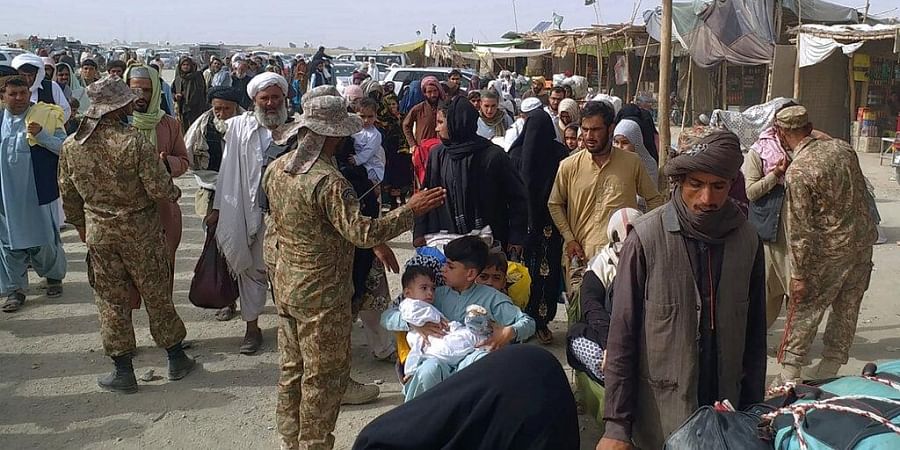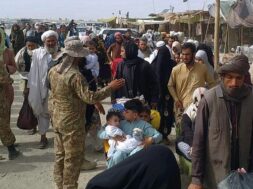
Afghanistan War: Two Protesters Killed in Jalalabad, Women Hold Demonstration as Taliban Held Talks on the Formation of Government
Manas Dasgupta
NEW DELHI, Aug 18: At least two people were killed and a dozen wounded in a shoot-out during the protests in the eastern Afghan city of Jalalabad, even as the former Afghan President Hamid Karzai and chief peace envoy Abdullah Abdullah have been negotiating with senior leaders of the Taliban on the formation of a government in war-torn Afghanistan.
According to Al Jazeera, “fairly sizable part” of Jalalabad’s residents were resisting the replacement of Afghanistan’s national flag in the city by the Taliban banner. Video on social media showed the crowd at the city’s Pashtunistan Square dispersing as the sound of gunshots rang in the background.
According to TOLO News, a group of locals took to the street as they demanded the restoration of Afghan national flag in place of the Taliban flag. Reports claimed that Taliban fighters fired at some of the demonstrators leading to at least two deaths.
In another incident, the Taliban have blown up the statue of Shiite militia leader, Abdul Ali Mazari, who had fought against them during Afghanistan’s civil war in the 1990s, according to photos circulating on social media on Wednesday.
Abdul Ali Mazari, a militia leader, was killed by the Taliban in 1996, when the militants seized power from the rival warlords. Mazari was a champion of the Afghanistan’s ethnic Hazara minority, Shiites who were persecuted under the Sunni Taliban’s earlier rule.
The statue stood in the central Bamyan province, where the Taliban infamously blew up two massive 1,500-year-old statues of Buddha carved into a mountain in 2001, shortly before the U.S.-led invasion that drove them from power. The Taliban had claimed that the statues of Buddha violated Islam’s prohibition on idolatry.
Despite the horrors of the last Taliban rule for women in Afghanistan, videos emerged on social media of a small group of women holding placards and demanding equal rights on the streets of Kabul on Wednesday, probably the first agitation of its kind since the militant group seized control of the country even as thousands of Afghans kept attempting to flee Taliban rule.
Four women in black abayas and hijabs were seen holding up signs and shouting slogans even as Taliban fighters patrolled nearby. In another clip, shared by an Al Jazeera correspondent, more women were seen marching through the streets, chanting slogans. The armed men seem to be pointing and speaking to the women, but don’t appear to be getting in the way of their protest.
On Tuesday, Taliban representatives promised to protect the rights of women which was a major concern given the militant group’s history of clamping down on women’s rights and freedoms. Notably, when they were last in power, women were largely confined to their homes, not allowed to study or work, and could only travel if accompanied by a male chaperone.
“We are going to allow women to work and study. We have got frameworks, of course. Women are going to be very active in the society but within the framework of Islam,” Zabihullah Mujahid, the group’s spokesman, said at a press conference in Kabul. Since it managed swiftly to seize control of many cities across the country with minimal resistance over the last few weeks, the Taliban has sought to portray a more moderate front as compared to its brutal regime over two decades ago.
But activists and world leaders are raising concerns about history repeating itself, pointing at possible human rights violations that are likely to take place under the Taliban’s rule. One of Afghanistan’s first female mayors, Zarifa Ghafari, earlier said she had no option but to wait for the Taliban to come and kill her.”
In just seven days, Taliban have captured Afghanistan by winning city after city. With women disappearing from the streets and men donning traditional attire, people who remember the ultra conservative militant rule desperately want to flee the nation.
A Taliban commander and senior leader of the Haqqani Network militant group, Anas Haqqani, met for talks with Karzai who was accompanied by Abdullah Abdullah, the head of the Afghan National Reconciliation Council.
The Haqqani Network constitutes an important faction of the Taliban which rose to prominence after capturing capital Kabul on August 15. The network is primarily based on the border with Pakistan, and has been accused of some of the deadliest militant attacks in Afghanistan.
The former Afghan President and chief peace envoy have been negotiating with senior leaders of the Taliban since the fall of Kabul. Talks are being held in the Afghan capital to expand the scope of the future Afghan government by including non-Taliban members. Senior Taliban leader Amir Khan Muttaqi has already held several rounds of talks with Kabul’s former political leadership in this regard, with the latest round of discussion being held on August 17. Taliban spokesperson Zabihullah Mujahid had said earlier that the new government will be more “inclusive”.
The U.S., which is facing criticism for the “mess in Afghanistan,” has evacuated more than 3,200 people from Kabul. U.S. President Joe Biden and British prime minister Boris Johnson had a conversation with each other on the situation of Afghanistan and agreed to hold a virtual G7 leaders’ meeting next week to discuss a common strategy and approach, the White House said.
India, like many other nations, has closed its embassy and is evacuating Indians from the troubled nation. The visas of Afghans living in India is being extended and emergency visas are being given to those who wish to come to India.
Meanwhile, China, on Wednesday said it would decide on extending diplomatic recognition to the Taliban in Afghanistan only after the formation of a government in the country, which it hoped would be “open, inclusive and broadly representative.”
“China’s position on the Afghan issue is consistent and clear,” Chinese Foreign Ministry spokesman, Zhao Lijian, told a media briefing, answering a question that when will China accord diplomatic recognition to the Taliban insurgents.
“If we have to recognise a government, the first thing is that we will need to wait until the government is formed,” he said.
He also reiterated China’s stand that besides forming an “open and inclusive” government in consultations with other factions, the Taliban must also keep its word to not permit any terrorist forces, especially the Uygur militant group from Xinjiang province- the East Turkistan Islamic Movement (ETIM).
According to a recent UN report, hundreds of militants, belonging to the ETIM, are converging in Afghanistan amidst the military advances made by the Taliban.
The European Union has no immediate plans to recognize the Taliban after their sweeping victory in Afghanistan but will talk with the militants to ensure that the European citizens and Afghans, who have worked with the EU, can leave safely, the bloc’s top diplomat said.
Speaking after leading emergency talks among the EU’s foreign ministers, EU Foreign Policy chief, Josep Borrell, also underlined the importance of opening talks with the Taliban to help prevent a new exodus of refugees as a humanitarian crisis unfolds in the conflict-ravaged country.
“We have to get in touch with the authorities in Kabul, whatever they are. The Taliban have won the war, so we will have to talk with them,” Borrell told reporters. “This dialogue will also have to focus on the means to prevent the return of foreign terrorists,” he said.
The EU has decided to suspend development assistance to the Afghan government now that the Taliban has seized power, but the 27-nation bloc is weighing whether to boost humanitarian aid.
The British Prime Minister Boris Johnson said the Taliban would be judged on their actions, not their words, after they sought to convince the world that they would not seek revenge after seizing Afghanistan.
Addressing the parliament, which was recalled from its summer break to discuss the situation in Afghanistan, Johnson ruled out any resumption of military action in the country and instead called on the United Nations to lead a humanitarian effort.
“We will judge this regime based on the choices it makes, and by its actions rather than by its words, on its attitude to terrorism, to crime and narcotics, as well as humanitarian access, and the rights of girls to receive an education,” Johnson said.
Britain has said that it would welcome up to 5,000 Afghans during the first year of a new resettlement programme that will prioritise women, girls and religious and other minorities, as part of Western plans to help those leaving the country.
Meanwhile, the Union Civil Aviation Minister Jyotiraditya Scindia has said the Central Government would make all efforts, like it did in the ‘Vande Bharat Mission’, to bring back Indian citizens from Afghanistan.
“The Indian government will bring its citizens back to their homes from Afghanistan, like we did in the Vande Bharat Mission, through Air India and the Indian Air Force (IAF) planes, whichever way is possible,” Scindia told reporters.
Meanwhile, the Afghan embassy in Tajikistan has asked Interpol to detain dethroned president Ashraf Ghani and his aides Hamdallah Mohib and Fazal Mahmood Fazli on charges of stealing public wealth. Ghani was claimed to have escaped from the country with four cars and a helicopter loaded with cash.













